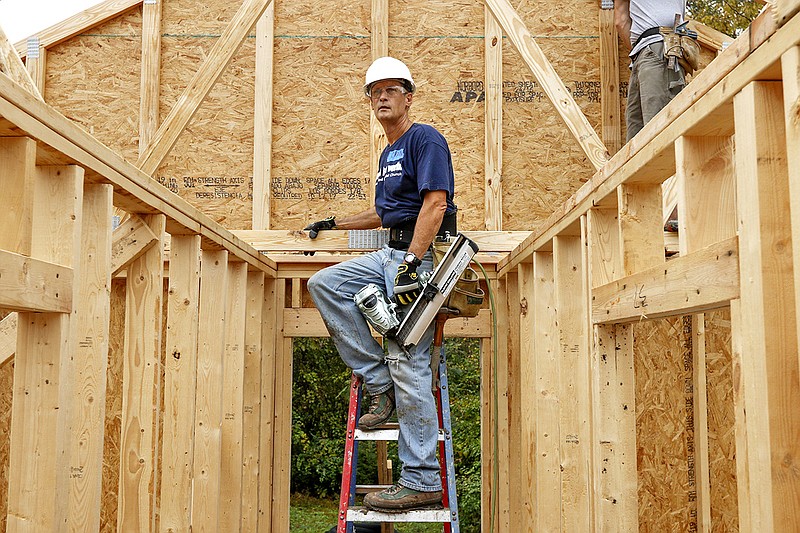For many nonprofit organizations, volunteers are the lifeblood of operations. Here is a look at how three local nonprofits are adapting to the drastic dropoff in volunteers due to the coronavirus pandemic.
___
Habitat for Humanity of Greater Chattanooga Area helps build affordable homes for low-income families.
* Volunteers are critical on home building sites and at ReStores, where new and used cabinets, furniture, appliances and building materials are sold to the public at 50-75% below retail prices. Volunteers also typically have a role in various family services and events. But in March, Chattanooga's Habitat suspended all volunteer activity in order to help prevent the spread of COVID-19 - a move which is expected to have crushing ripple effects, as volunteers often become donors, says Phil Trammell, vice president of development for the local Habitat.
"We don't expect to recover our volunteer force all at once - nor do we think that would be the safest option for our community. The pandemic has caused us to adapt the number of people we can accommodate safely. We hope that one day we can all socialize freely with our volunteers like we have in the past, but I anticipate that is going to be a long road ahead of us." - Madison Bradford, Habitat development and communications manager
* How to help: Contact Habitat's volunteer engagement manager at hmuller@habichatt.org to book a volunteer shift.
BY THE NUMBERS
80, average number of volunteers per month on building sites in 2019
152, average number of volunteers per month in ReStores in 2019
0, number of volunteers on building sites and in ReStores March-May 2020
21, number of volunteers on building sites in June 2020
32, number of volunteers in ReStores in June 2020
___
Chattanooga Community Kitchen works to meet the most basic needs of hungry, homeless and vulnerable people in the community, primarily through its day center which offers three hot meals a day and give-away programs for clothing and household items.
* The Community Kitchen typically relies on 30,000 volunteer hours each year. Volunteers are especially important as part of the kitchen's food services, where they prepare and serve meals. They also help sort clothing, canned goods, supervise overnight shelters, answer phones and provide clerical support.
"To some degree, we anticipated and prepared for the immediate loss of volunteers. We knew we'd need to reassign staff to cover operations. As the pandemic continues, the stress on staff is apparent. We hope volunteers return soon so staff members can continue working to eliminate homelessness. Some programs will change significantly; others will have only minor tweaks. We do not, however, plan to eliminate any services." - Trish King, Community Kitchen volunteer and church relations coordinator
* How to help: Greatest volunteer needs are for food services, followed by the clothing program. To sign up, visit homelesschattanooga.org and click "Get Involved."
BY THE NUMBERS
12-15, number of volunteers needed per day in food services
2-3, number of volunteers needed per day to help support the day center
2, number of volunteers needed per day in clothing program
1-2, number of volunteers needed per day to answer phones, work welcome desk
10, percent of volunteer-based roles being filled amid the pandemic
___
Happinest Wildlife Rehabilitation and Rescue is committed to rehabbing sick, injured and orphaned wildlife in Tennessee, and ultimately returning them to the wild.
* With no paid staff, volunteers comprise 100% of Happinest's labor pool, from caring for and transporting injured animals, to organizing events, writing grants and networking on social media.
"The lack of volunteers is one place the pandemic has hurt [Happinest] the most. The Easter tornado during the shutdown caused the highest number of songbird intakes in the month of April I've seen since I began rehab. Between having more animals, less volunteers, a nationwide mealworm shortage and less donations to provide for their care, it has become nearly unsustainable." - Sherry Turner Teas, Happinest co-founder
* How to help: Those interested in volunteering may go to happinestwildlife.com/volunteer to complete the online application, or email the volunteer coordinator at happinestvolunteer@gmail.com.
BY THE NUMBERS
0, number of paid staff
30, number of minutes between baby bird feedings from sunup to sundown
600, average number of songbirds rehabbed by Happinest each year
80, percent decrease in volunteers since the pandemic
READ MORE
* We Over Me: Borne of the pandemic, grassroots benevolence organization takes its first steps
* Grassroots Chattanooga mask makers step up for frontline workers, family members
* How do virtual fundraisers compare to the in-person events of years past?
* Philanthropy in times of crisis: How will the coronavirus affect giving?
